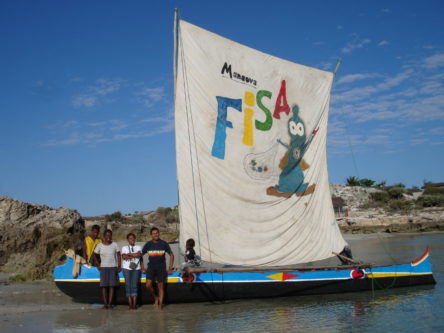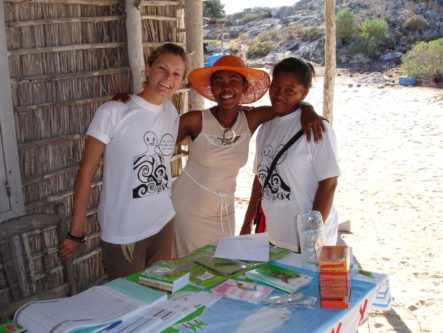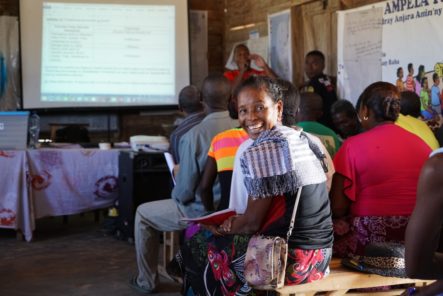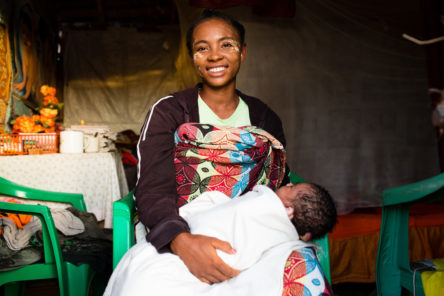Imagine what it must be like to have control over your fertility for the first time, particularly if you hadn’t even known that it was possible. For the first time you can choose to delay having a child, perhaps allowing you to complete your education, earn a living, better look after your existing children, or perhaps simply because you’re not ready.
Over time, as you see the benefits of making your own reproductive choices, might this influence whether you believe you can shape your future in other ways? Is it possible that having this freedom to choose ultimately enables women and couples to realise that they have choices in many aspects of their life, and that they have it within themselves to create the lives they want?
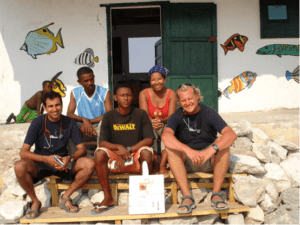
Vik Mohan and Craig Nolar (bottom L and R) preparing for the first clinic, with BV conservation staff Gildas (bottom centre), Daniel (top L) and Vola (top R) on hand to provide transalation services.
Visiting our team in Madagascar this month, it doesn’t feel like ten years since we started community health work. As Craig Nolar (Blue Ventures’ Expedition Medical Officer at the time) and I wandered down to the village of Andavadoaka on 17th August 2007 to open our first family planning clinic, I remember very clearly the excitement we both felt. Living and working with Vezo communities, it had become clear that their access to healthcare, and to family planning services in particular, was very limited. We had decided to develop a family planning service at their request. In our naive enthusiasm, we really had no idea what we were putting in motion.
We had been loaned the use of a concrete hut, which was to be our clinic for the day. After tidying up, and trying to create something that resembled a clinical environment, we opened the clinic and waited. An eighteen year old girl confidently walked in, stating that she had a boyfriend but did not want to get pregnant yet. As this was our first client, Craig and I took our time and conducted a joint consultation. Unbeknownst to us, during this time our “waiting room” was starting to fill up: as we opened the door to let her out, we were greeted by the sight of Andavadoaka beach overflowing with women and couples waiting to be seen in the clinic! The air was filled with the sounds of singing, laughter and excited chatter. Suddenly daunted by the immensity of the task ahead us, Craig and I got to work in our separate consulting rooms.
“Since the birth of my 5th child I’ve been too exhausted to look after my family properly. I’ve had two more children since then. Two of my children have died. My husband won’t use a condom.”
– 28 year old woman
We worked until dark, yet there were still so many women waiting to be seen. We promised that we would see them all, and spent practically the whole week in the clinic. After this exhausting and overwhelming start, we realised that we had already seen over 20% of all women of reproductive age of Andavadoaka. What overwhelmed us was not the number of consultations we’d conducted, it was the immensity of the unmet need for family planning services that we’d uncovered. In all of my time as a doctor, I’d never spoken to women whose lives had been completely dominated by an inability to avoid getting pregnant, and the stories I heard will always stay with me. Every village we went to, the stories reflected the same unmet need. We’d listened to communities, we’d responded, and it was becoming increasingly clear that we’d stumbled across something vitally important.

The original Safidy logo.
Without significant funding, our nascent community health programme relied heavily on the enthusiasm and creativity of a succession of truly inspiring volunteers. In recognition of the fact that we were providing women and couples with family planning services, enabling them to make their own reproductive choices, the programme was dubbed “Safidy”, the Malagasy word for “choice”.
Community theatre became the preferred medium for delivering health education. Football tournaments turned out to be an effective way of engaging men in discussions around sexual and reproductive health. The sail of our pirogue in which we travelled from village to village was emblazoned with a familiar family planning logo and the character “Captain Condom”, so that everyone would know that the family planning clinic was coming to town.
The dedication of our Safidy staff and volunteers has ensured that Safidy has survived and continued to meet the needs of communities throughout the various challenges of the last decade, from the 2009 political crisis and associated public health funding cuts to the devastating cyclone of 2013. As Safidy became more established, our initial excitement evolved into a commitment to providing the highest quality services we could, and upholding the rights of the communities we serve.
When we received our first grant, it was like Christmas had arrived early! We were able to better support our team, reach more communities and add maternal and child health services (and subsequently water, sanitation and hygiene initiatives) to our programme. Thanks to the support of the funders and partners who have shared our vision, we have a community health programme that now serves over 25,000 people at three sites along the west coast of Madagascar. And as I write this we are laying the foundations for expansion into a fourth location: our mangrove conservation and fisheries management site in Ambanja.
As I watch Nick, our current Community Health Programme Coordinator, apply his expertise to supporting the development of Safidy in this new site, I realise how much we’ve learned: how to properly assess community health needs, how to deliver healthcare in a way that’s going to be sustainable, how to integrate this into our other activities to form a holistic approach to conservation.
Each time I return to Madagascar I sense greater confidence in the women I meet; greater willingness to express their opinions; greater engagement in issues affecting their community. It’s amazing to witness a dramatic increase in women’s participation in natural resource management meetings. Whatever has catalysed these changes, it must surely be underpinned by a growing belief that they have some control over their future, and their lives. I wonder if having greater control over their fertility, and of their health in general, has contributed to a strengthening of this belief.
If there’s one thing that unites all of the amazing people who have contributed to Safidy, it’s their passion for the work that we undertake and for what Safidy represents. Over the last ten years we’ve witnessed the incredible impact of this passion and commitment, and I cannot adequately express my gratitude to team Safidy, past and present, for all they have contributed.
More than half of women in the Velondriake area of reproductive age now use a modern method of contraception, and among young people the figure is even higher.
The impact that Safidy has made is something we all feel immensely proud of. More than half of women in the Velondriake area of reproductive age now use a modern method of contraception, and among young people the figure is even higher. (When we started, this figure was less than 10%.) Condom use has increased approximately tenfold. The average length of exclusive breastfeeding has increased from 2 weeks to 3 months. These are just some of the headlines; we’ve witnessed an increase in awareness and changes in behaviour relating to a wide range of health issues.
Ultimately, Safidy and the wider Blue Ventures team are not the agents of change. We simply provide communities with resources and opportunities. It is the women and couples themselves who have exercised their freedom to choose, who are creating the changes that we see. Their eagerness to embrace the opportunities that Safidy is providing, despite relatively little previous exposure to health education, is the most remarkable and inspiring thing that I have witnessed over the last ten years. If this is what we’ve been able to achieve together so far, imagine what the next decade will bring!
Explore our interactive Discover story: Safidy: The Freedom To Choose
Watch Vik Mohan’s TedxExeter talk: How listening to communities can help save our oceans


